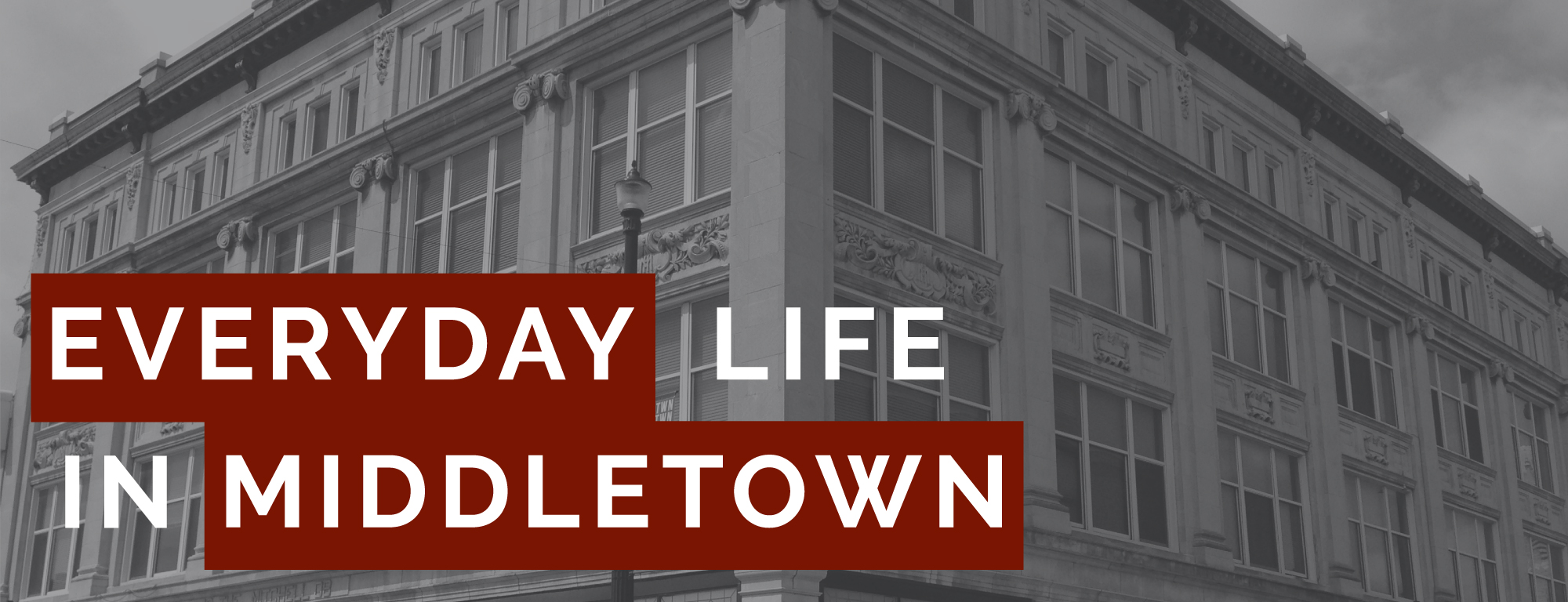This week, we conclude our “Four Muncies” series by highlighting the directive written by “Lafe,” one of our most prolific and creative writer/volunteers. Lafe lives in the country outside Muncie but drives in and out to work, volunteer, and take part in cultural activities. And, as the diary makes clear, Lafe nonetheless identifies, somewhat ambiguously, with the community. Like the neutral mind, whose directive we highlighted two weeks ago, Lafe is both insider and outsider to Muncie–a sort of positioning that he is used to as a gay man in his sixties, “adept at living between worlds” and operating “in the gay subculture and the dominant hetero-centric society at large.” Lafe has also experienced some of the social ills of the community firsthand, having been harassed and had his property vandalized by people inhospitable to his sexual orientation.
This directive is packed with insights and lovely moments, but perhaps its governing concept is the notion that Muncie is multiple places to him at once. (Indeed, in titling this series we stole this idea of a plural Muncie from Lafe.) For Lafe, Muncie is simultaneously the struggling rust belt city, the rebounding community with “a lot going for it,” the source of cultural stimulation and inspiration, the city of corruption and segregation, a community limited by cultural and religious conservatism, a city that, like seemingly all other cities its size, hosts the “mangy, rangy, grasping commercialism” of McGalliard’s cookie-cutter commercial strip.
But perhaps above all, and most uniquely, Muncie is to Lafe the rural place where he and his partner have made a home, a sanctuary amid the fields and wildlife of Delaware County. The images and formatting of this directive capture this beautifully; they are original to Lafe and his partner, and we reproduce them here as he sent them to us.
Enjoy! And feel free to respond using the comments box below.
–Patrick Collier
Diarist A29 Directive 1

The view out our front door. Photo credit: Alexander
Do you think the ways other people think about Muncie are the same ways you think about it? How do you your thoughts and feelings about Muncie differ from its public image (from media or word-of-mouth around the state and beyond)?

or nigh onto 30 years my address has been Muncie, Indiana. For nearly half my life the U.S. Postal Service has assigned Muncie as my home town. This has always struck me as a little heavy-handed. Country bred and born, I chafe at being told I live in town—too many people, too many buildings shouldered one up against the next. The Muncie I live in is dotted with stands of timber and open fields of soybeans and corn. A river flows through it. Arrowheads and other artifacts wash up on its banks, reminders of the people who once inhabited this landscape.
The Muncie I live in is rural, dotted with churches, working farms and some people who still live close to the land. We all keep to ourselves, mostly. Neighbors call on each other very infrequently nowadays, far different from what I was accustomed to in childhood.
My appreciation for the Muncie I live in has grown through my study of local history. I’ve traced the title to this particular plot of land we live on, read about the lives of early settlers, pored over old maps of this township, read biographies of some of the folks buried in the little country cemetery nearby.


Inquisitive spotted tagalongs. Photo credit: Lafe Masked bandits at play. Photo credit: Lafe
Not alone
The Muncie I live in I share with a variety of wildlife. My husband “Alexander” and I see many deer—a pair of fawns followed us about one summer as we were often out in the woods cutting downed trees for winter fuel. Coyotes frequently yip and yammer their screechy wails in our hearing—sometimes too close for comfort. A family of raccoons occupies a hollow in a tree outside our living room window; this summer we watched the little ones play and cavort among the branches. Opossums, weasels and foxes are among the critters we try to keep away from our chickens. Eagles have built a nest high in a tree in our woods. We hear owls regularly. See redheaded, red-bellied and downy woodpeckers, goldfinch, house finch, rose-breasted grosbeaks, cardinals, titmice, nuthatches, house sparrows, blue jays and more at our bird feeder.
How long have you lived here? If you were not born here, indicate where you came from and why.
Finding home
We have lived in our current home since 1999. We found this house after a long search, after having been evicted from an apartment for being two gay men daring to live together. As we were house-hunting we listed elements of our dream home:
secluded
soul-nurturing
swimming pool (My eight-year-old twin sons added this. Their priority, not ours.)
trees
lots of windows
country setting
character
We doubted we’d find such a place. Save for the swimming pool, we did.
Alexander and I saw an announcement in the Star Press for an open house at a rural address. It wasn’t in the area of the county where we’d been focusing our efforts, but we’d been having a dickens of a time finding anything so we decided to check it out. It was love at first sight. We walked through the house, starting at the front door. By the time we reached the back door we told the real estate agent we were ready to make an offer on the property. The house and one acre. We followed her back to her office and did so. We’ve never regretted it.
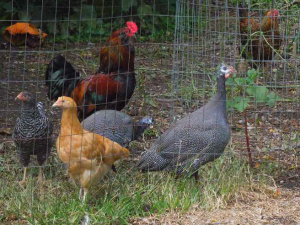
Birds of a feather flock together. Photo credit: Lafe

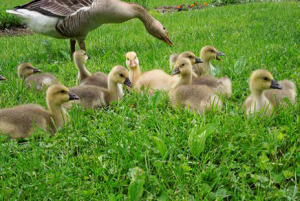
My kind of chick! N. supervises the youngin’s.
Photo credit: Lafe
One evening after we had been here a few years a car with Tennessee plates pulled into the drive. It was the woman who owned the wooded acreage around us, part of the original parcel. Her son was with her. She and her late husband had long planned to build a house in the woods. Now with him gone, she was interested in selling the land to someone who would love it as much as she and her husband had. Were we interested? We were. We arranged to buy the 17 acres on contract. Included was an old barn, the perfect home for our three chickens, then housed in a doghouse, and for their flock-mates I longed to add.
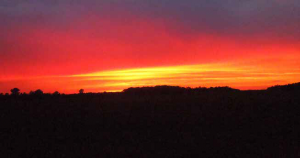
Sunset over the farm fields adjoining our Muncie. Photo credit: Lafe
What are your feelings about Muncie’s future? What are your hopes for Muncie? How do you expect Muncie will fare in the years ahead? What changes do you expect?
What the future holds
We see ourselves as stewards of this place rather than owners. We’re not going to hold onto this property forever. Soon enough it will pass into other hands. Everything does. We heat by wood we cut ourselves from the land. We recycle. We compost. We had solar panels installed to generate electricity. As any homeowner knows, upkeep on a home is a never-ending task. This and caring for livestock keeps us busy, in addition to artistic pursuits and volunteer activities. We’re growing older; how long will we be able to maintain the place? At 70, Alexander started cutting back on his extensive flower gardens; the time and energy required for their care and upkeep has become too much.
During our recent vacation to the Southwest we kept an eye open for places we might move to in retirement. We talked with some folks who split their time between the Southwest and the Midwest. Perhaps this is an option for us. But in my heart of hearts I doubt it.
My grandmother lived to 103, stayed put in her in northern Minnesota community, lived by herself out on the home place for as long as she could, then moved into town to a senior citizens’ apartment building. Can we do the same? Stay here for as long as possible? Then where? In-town Muncie proper? Some small stultifying apartment crammed in amongst other buildings? It’s not a future I look forward to. Bet we’ll stay in Delaware County out of inertia. Because it’s not too far from the kids. Because it’s the devil we know. Because we don’t have the resolve, the gumption, to pull up stakes and move elsewhere. We love our home—our Muncie—but if it becomes untenable to live here, we’ll probably move into the other Muncie because by that time in our lives it will be just too much bother to go elsewhere.
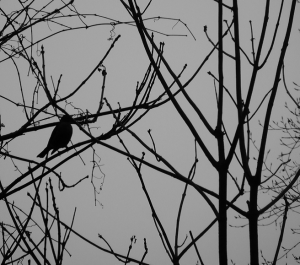
Ready to take flight. Photo credit: Lafe

Round and round and round we go. Photo credit: Lafe
City of yes-no
This other Muncie—the Muncie I do not yet live in—is a city of contrasts. It’s a typical Midwestern city, enlivened by a state university and a regional medical center. Hard hit by the decline of automotive manufacturing, by the opioid epidemic, by entrenched racism, systemic poverty, religion and politics, to name a few of its many challenges.
Yet it has survived. It has changed and will keep changing in response to the slowly, slowly evolving demographic of its inhabitants as well as the vicissitudes of climate change and the national economy. Big shapers of the local scene are the Ball Brothers Foundation, Ball Memorial Hospital and Ball State University. These have made and will continue to make a big impact on the city of fruit jars.
It’s a city with a lot going for it. A river runs through it. A vibrant downtown scene now flourishes. The Whitely neighborhood garners national attention for demonstrating what a group of committed citizens can do to effect change in their community. Gardeners and groundskeepers at Minnetrista’s extensive gardens offer showplace plantings free for public viewing. Here and there, historic buildings are preserved. The past is not altogether forgotten. Bronze statues of a Native American stand as reminders of the area’s heritage and offer continuous appeal to the Great Spirit. Thank goodness someone is praying for us.
The Muncie that is not mine nourishes me through its presentations of live theatre. For me this is no small matter. Theatre enriches my life and I am very grateful. Ball State University’s Department of Theatre and Dance is top notch and mounts dynamite shows throughout the school year. Muncie Civic Theatre offers a full range of theatre offerings, while Think Dog! Productions and other independent theatre groups provide additional opportunities for engagement with ideas, stories, concepts, emotions, and the magic that is live theatre.
I go to the Muncie I do not live in for groceries, drug store, farm store, Goodwill, for general services. I doctor there. I volunteer my time at various charitable organizations there.
When out-of-state friends come to visit we take them to the David Owsley Museum of Art on the Ball State campus. We take them to Muncie Civic to see a show. We take them to Ivanhoe’s in Upland for milkshakes. We take them to the Indianapolis Museum of Art and to the nearby canal walk. We take them on the walking trail that wends through our woods.
I don’t like to show out-of-town visitors McGalliard Avenue. Its mangy, rangy, grasping commercialism leaves me cold. It could be Anywhere, U.S.A., with its many cookie cutter national chain stores and restaurants (is that all we care about, our stomachs?)
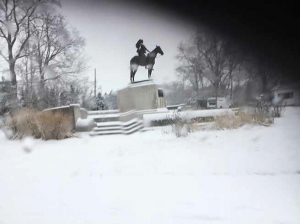
We’ll take all the help we can get. Photo credit: Lafe

Patriotism sells. At the corner of Walnut and McGalliard Road. photo credit: Lafe
Other aspects of the city put me off, as well. The tenor of local politics, political infighting and rampant corruption leave me cold, as does the continuing divide between black and white. Muncie is a diverse community, but many of its minority members remain out of sight. Speaking of missing in action, the court house, conspicuous by its absence, sends shivers down my spine. A community that values instant gratification and shows little regard for its past has something rotten at its core. This something does not engender civic pride.
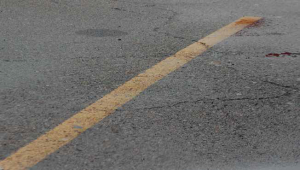
A long yaller stripe. Photo credit: Lafe
How would you describe Muncie to someone who has never been here? What are its most distinctive characteristics?
Between a rock and a hard place
As I write this it is 60 degrees outside, and is supposed to drop to 13 degrees tonight. I mention this to an acquaintance. “That’s Indiana for you,” she says with a rueful smile and a shake of the head. Most folks I meet express a similar sentiment about living in Muncie. In 30 years I’ve run into only one person who is unabashed in her expressed enthusiasm for growing up and living in Muncie.
When I am asked on vacation where I’m from I reply, “Indiana.” Pressed, I say, “north of Indianapolis, about half-way to Fort Wayne.” Only if further pressed do I say, “Muncie,” and I am always surprised if the other person has heard of it. When this does happen it’s often because she or he has some connection with Ball State University. I don’t expect people outside the state to have heard of Muncie. What do I know of Great Falls, Montana?
Yet I bristle to read authors who seem to think the only two cities in the United States are New York City and Los Angeles. Much life—many stories—reside between these two poles. It takes colossal ignorance and arrogance to think otherwise. Let’s hear it for Muncie, Great Falls, and all the other places that exist betwixt and between.
As a gay man, this is familiar territory to me. I am adept at living between worlds. I operate in both the gay subculture and the dominant hetero-centric society at large. This skill comes in handy in both the Muncies of my experience. Our house, our wooded acres, our chickens, geese and cats—these are refuge to me. In my husband’s arms I find safety, peace and solace. However, we are surrounded by rural Indiana—not a bastion of health and welcome for gay men. We know this first-hand.

Our chimney is not the only thing to cast a long shadow across our life in Muncie. Photo credit: Lafe
Are you happy with where you live? Do you feel like you belong?
Pleased to meetcha. Now get lost.
On one occasion Alexander was in front yard when a vehicle slowed. “Fag!” someone shouted and the vehicle sped away. We are always on alert when a vehicle slows or stops outside our home, especially when we are outside, alone or together. My fear is a rifle is being slowly raised, aim taken, a finger tightening on the trigger. This is the Muncie I live in.
We’d lived in our home a few years when we went through a stretch of perhaps three years during which our home was vandalized repeatedly. It started with our mailbox being bashed in time and time again. Eventually we took the mailbox off the post each evening and carried it inside for safekeeping. Our vandal was not to be deterred. He rammed the post with his truck until he knocked it over. We responded by bringing both mailbox and post in at night. Thereafter began a series of escalating incidents. The house was egged (something that still happens from time to time). White powder and bags of “anthrax” were left on the porch, sidewalk and front lawn. Other incidents occurred, culminating in a fire lit on the front porch. Rural Indiana is not a safe place for people who are counted different. This is the Muncie I live in.
The state I live in is predominantly Republican: we gave the nation Mike Pence, after all. And Mike Pence is no friend to the gay community. The Religious Freedom Restoration Act (RFRA) he championed while Indiana’s governor was proof positive of this in legislating permission to discriminate against gay and lesbian persons. On a state level Hoosier hospitality does not include gay, lesbian, bisexual and trans persons. And this is the place I live in. It is no safe haven for people who are different.

Here’s your sign, homo. Photo credit: Lafe

Stained glass detail from a downtown Muncie church. photo credit: Lafe
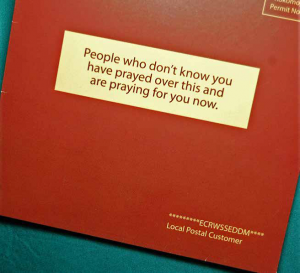
I’m sure they mean well, but that doesn’t mean they’re not ready to condemn me to hell. Photo credit: Lafe
The long arm of religion
Both the Muncie I live in and the urban one nearby are peppered with churches. Indiana is part of the Bible Belt and the influence of religion permeates life here. And not always in a healthful way. I am especially sensitive to this as a gay man. When I came out I was part of a mainline Protestant denomination which refused to embrace gay and lesbian persons. Members of my church characterized me as a bat out of hell, reprobate, anathema. They struck my name from the membership roll, banned me from attending services, and ordered me to have no contact with church members. Excommunicated me.
In today’s mail arrives a brochure, mass-mailed to local postal customers. “People who don’t know you have prayed over this and are praying for you now,” reads a statement on the cover. Can they know how creepy this sounds to someone like me? The inside unfolds to form the shape of a cross, echoing the enclosed small metal cross medallion, punched and ready for me to wear on a chain about my neck. Printed inside the brochure is an assurance that as a sinner I am barred from heaven unless I follow the easy-to-read instructions and say the words they have thoughtfully provided for me.
I find such proselytizing offensive, short-sighted, simplistic and rude. It takes no account of my history growing up in an evangelical church family, nor the faith journey that has led me to part company with it. It presumes so much; ignores the reality of other faiths and those who choose to live outside the strictures of religion.
Yet this is part of the Muncies I know: Protestant Christianity is assumed; traditional mores and values are revered and heaven help those who don’t measure up to the standards set by church and community. In many settings, mention of my being gay goes over like a lead balloon. A lead balloon dropped on the other person’s toes. People offended to learn I am gay register their disapproval in verbal and nonverbal ways. Some perceive my being gay as a physical threat. I’ve learned to monitor what I say and to whom, how I act, how I walk, what I wear.
Costly lessons from the school of hard knocks
I paid a high price for coming out gay in midlife, as did Alexander. In saying, “I am a gay man” I lost my marriage, children, family, job and career, home, friends, church, and more.
Nearly 25 years out, my children will have nothing to do with me. Thankfully, Alexander’s children and grandchildren embrace us. But gay-related issues are not mentioned unless we bring them up. And then only for as long as we do the talking. The topic does not engender discussion. A big part of our experience of life remains unrecognized, unexplored, unknown in our family circle. Religion is the stumbling block. Religion and ingrained societal homophobia. Our families have been taught to dismiss gay people as a matter of religious belief and societal ick. Both Alexander and I have family members who refuse to have anything to do with us.
At a family wedding this past fall (to which we were invited, still something of a novelty) a nephew asked to hear my coming out story and what life has been like for us thereafter. He kept at it, asking questions, wanting to hear more. “I was too young to know what was going on,” he said, “and nobody ever talks about it. Tell me more.” This was the first time in 25 years a member of either one of our families has asked to hear our story.
After coming out I had to rebuild much of my life from scratch. I learned I can form a family of choice, of people not related by blood, but by temperament, shared values, and mutual commitment. I learned the church is not a safe place for me—those who profess love and caring can turn savage and act in destructive ways. I learned to distrust the educational system, the legal system, the religious system, the health care system, the political system. People acting on their own are one thing—somehow something altogether different happens when they become part of a bureaucracy.
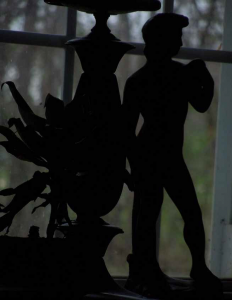
Societal and religious lessons in intolerance and arrogance start early: our pious nine-year-old grandson confronted his grandfather Alexander about the replica of Michelangelo’s “David” that graces our home. “That’s inappropriate,” the boy said. Photo credit: Lafe
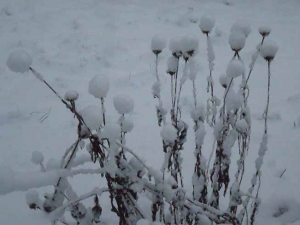
Like calls out to like. Or yearns for it, anyway. Photo credit: Lafe
(Still) in search of community
Over the years Alexander and I have sought safe people and safe places, sought to find a supportive community where we are welcomed, embraced, accepted and valued. At the same time we have kicked against the notion that in order to find such a place we have to move to the big city or to one of the coasts. We like country living. We like the Midwest. We’re stubborn enough to want to not give this up.
A sense of community has proved elusive for us. The Muncie we do not live in has a gay bar in The Mark III Taproom. Hallelujah. We have met gay people in Muncie, have found them to be warm and wonderful. And have not connected with them at a heart level. Our closest friends live outside Delaware County. We know a gay couple that live on a farm near Richmond. With them we feel safe, understood, deeply welcomed. We meet once a month with three gay men from Indianapolis, have been doing so for over 20 years. These friends know and love us, offer support, share encouragement and laughter.
Three days each summer the heavens open and I step into paradise. That this happens at all is marvelous; that it happens in southern Indiana is nothing short of miraculous. Alexander and I belong to a nationwide group of gay, bisexual and trans men who share a common commitment to self-awareness and personal growth. Each year about 100 of these men from across the county gather in Indiana for a three-day retreat that includes community-building exercises, workshop intensives, small-group meetings, performances, and time for rest and relaxation. The atmosphere is unlike anything else I have known. These are men with whom I can have deeply soulful conversation and encounters. It is the one time out of the year when I totally drop my guard, feel safe and surrounded by loving acceptance. The charge I get from these three days nourishes me throughout the next 362. I light a candle from the fires of paradise and carry it back with me to the Muncies I inhabit.
Part of it comes about by intention, a setting of the will. Making do with what we have. Over our fireplace hangs a framed copy of these words adapted from Ira Progroff: “I enter [our home] as a sanctuary, a place of refuge, a protected space safe from the outer pressures of the world. / Here I quietly evaluate my relation to my life; here I find a protected pause in my activities which I use to deepen and expand my perspectives on being. / Here I find my heart’s home.” Would that I will be able to say this about the urban Muncie I shall likely call home soon enough.

A statement of intention graces our hearth. Photo credit: Lafe

